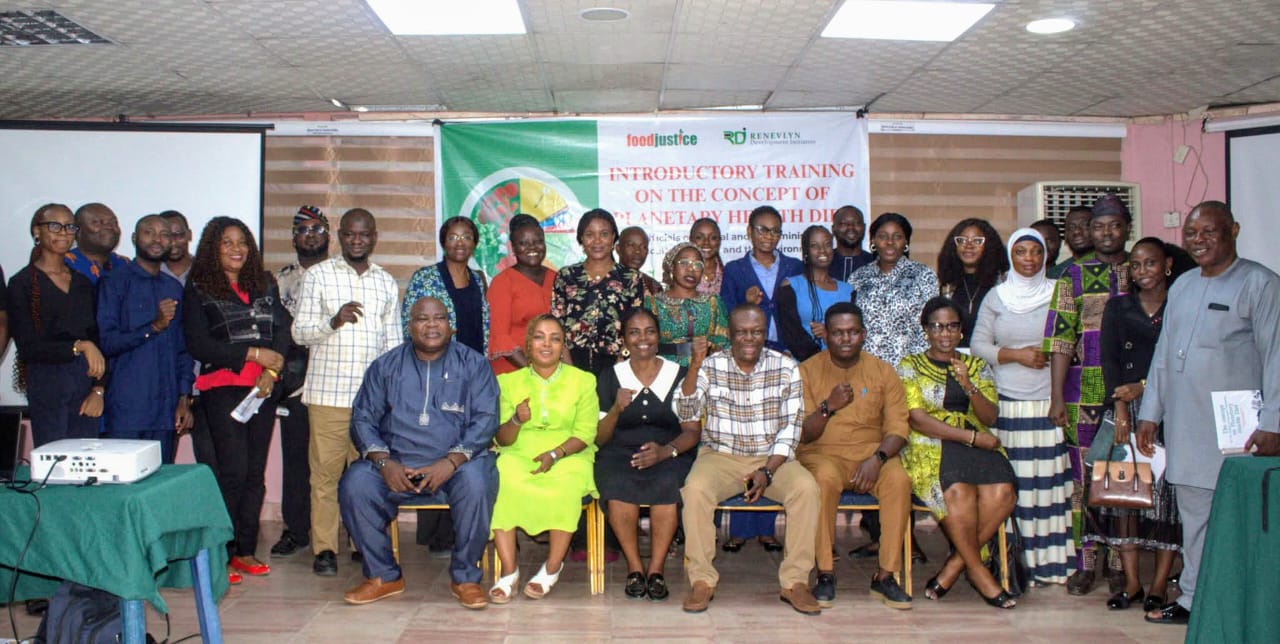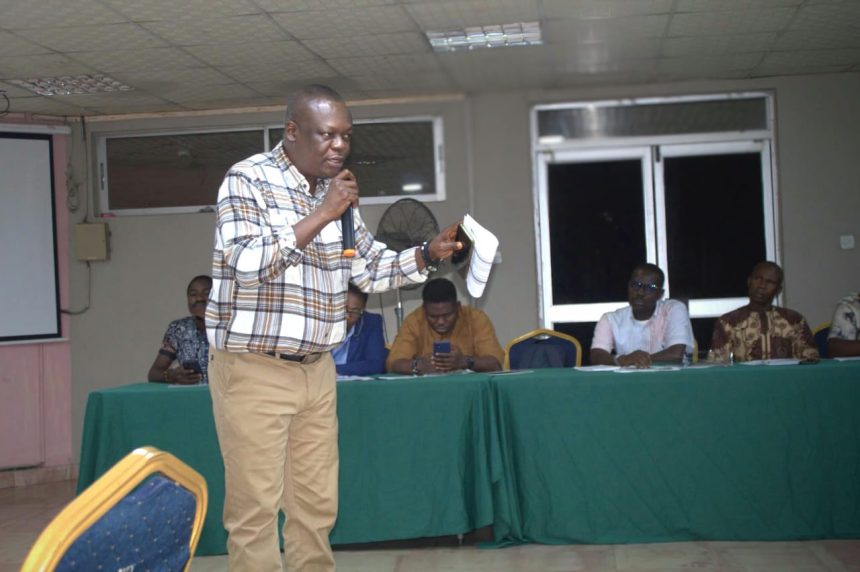By Chidi Ugwu
The Renevlyn Development Initiative (RDI) and Germany-based Foodjustice, have trained officials of the Federal ministry of environment and Lagos state ministries of health, environment and agriculture on mainstreaming the concept of Planetary Health Diet (PHD) into government policies.
The training which was held at the Excellence Hotel in Lagos was in response to what RDI and Foodjustice said was the rising rates of non-communicable diseases (NCDs) linked to poor nutrition in the African continent.
Speakers at the event included Andrea Arango Angarita (Ph.D.) of the Mexican National Institute of Public Health, Mishel Unar Munguía, Head of the Department of Maternal, Child and Adolescent Nutrition, Mexico, Percival Agordoh of the University of Health and Allied Sciences, Ghana and Dinah Stratenwerth of Foodjustice.
In his welcome, Executive Director of RDI, Philip Jakpor explained that Planetary Health Diet is a scientifically backed dietary pattern designed to be healthy for individuals and sustainable for the planet, with emphasis on plant-based foods and reduction of consumption of red meat and processed foods.

Jakpor noted that PHD reflects the intersections between what we grow, the ecosystem under which they grow and the positive outcomes when we consume them.
He lamented that while the clamour for adoption of this dietary pattern continues to grow globally, “Africa is largely missing in the scheme of things even as the continent grapples with the devastating impacts of malnutrition and the health challenges associated with consumption of unwholesome diet. As you all may already know, Non communicable diseases (NCDs) are a significant cause of deaths in Africa.
“In Nigeria NCDs account for about 30% of annual deaths and studies have shown that they are responsible for more illnesses and deaths than infectious diseases. In the year 2020, NCDs were responsible for 617,300 deaths in Nigeria, with 22% of these being premature deaths of persons between ages 30-70, he added, even as he called for the opening of pathways that would engender networking and ignite policy level intervention by the departments of government to promote planetary health diet.
Dinah Stratenwerth of Foodjustice explained that the training was conceived after the successful creation of a simulation game by the two organisations to introduce PHD to German students and Nigerians.
She stressed the importance of PHD to children and adults alike even as she noted that policy makers are key to the realization of the dream of a healthy citizenry hence the need for the Lagos training.
Andrea Arango Angarita (Ph.D.) of the Mexican National Institute of Public Health said globally people have continued to suffer from failure by governments to implement the Planetary Health Diet.
Angarita who spoke virtually, urged countries to compare notes as she highlighted measures that Nigeria can learn from the 2023 Mexican Healthy and Sustainable Dietary Guidelines (MHSDG). She noted that the document that defines dietary patterns in Mexico, was aimed at protecting population health, reducing environmental footprint and respecting Mexican food traditions.
She said that research shows that if the Mexican population fully adopted the MHSDG, it would achieve: “31.9% fewer total deaths from chronic diseases (34.6% reducing UPF); 29.6% fewer premature deaths before age 75 (32.5% reducing UPF); Approximately 89,000 deaths prevented and 43,000 premature deaths; Adopting the guidelines could result in over 700,000 years of life saved, mainly through reducing cardiovascular diseases and type 2 diabetes.”
In her intervention, Mishel Unar Munguía, Head of the Department of Maternal, Child and Adolescent Nutrition, Mexico explained that unhealthy diets and malnutrition are among the top ten risk factors contributing to the global disease burden.
“Given the harmful environmental impact of today’s food systems and concerns about their sustainability, there is an urgent need to promote healthy and sustainable diets.
“Healthy and sustainable diets are dietary patterns that promote all dimensions of individual health and well-being; they exert low pressure and environmental impact; and are accessible, affordable, safe, equitable, and culturally acceptable.” Munguía stated.
In his presentation Percival Agordoh of the University of Health and Allied Sciences, Ghana said that the current food systems are not only harming health, but also pushing the planet to its environmental limits.
He added that the concept of sustainable eating “emphasizes food choices that are healthy for individuals and beneficial for the environment, promoting both human and planetary well-being.”
According to him, Planetary Health Diet includes ‘Fruits and vegetables, Whole grains, Legumes and nuts, Animal products (meat, dairy, eggs).’
Speaking on the importance of PHD in children, Dr. Makoyawo Olayinka noted that PHD supports optimal growth and development in children, builds better immunity and improves learning and cognitive ability of children.
“To achieve this goal, family-level intervention and school meal programs play a pivotal role.” Makoyawo said, adding that the effort should be supported by “educational initiatives promoting balanced meal planning, the efficient use of plant-based protein sources and strategies to introduce sustainable dietary practices early in life.”
The highpoint of the training was the unveiling of the document – The Concept of the Global Framework Convention on Planetary Health Diet: A Simulation Game for People Aged 15 and Over, a joint work by RDI and Foodjustice.












